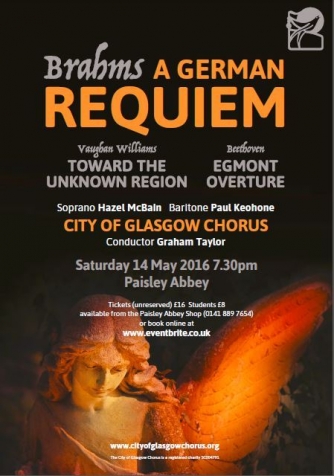Details
Paisley Abbey
Abbey Close
Paisley
Renfrewshire
PA1 1JG
Scotland
Programme
Johannes Brahms – Ein Deutsches Requiem, Op.45
Ludwig van Beethoven – Egmont, Op.84: Overture
Ralph Vaughan Williams – Toward the Unknown region
Performers
Hazel McBain – soprano
Paul Keohone – baritone
City of Glasgow Chorus
Programme Note
The City of Glasgow Chorus returns to Paisley Abbey once again for a performance of Brahms’ much-loved German Requiem featuring soloists Hazel McBain, Soprano and Paul Keohone, Baritone.
For many years, Brahms had been preoccupied with the idea of composing a Requiem but only in 1866, when he was 33, did he commence serious work on it. The work’s title reflects Brahms’ use of the Lutheran Bible rather than the Latin one, compiling the texts himself from both the Old and New Testaments. It has little in common with the conventional Requiem Mass, focussing as it does on the living.
There are seven relatively short movements in the work. The similarity of the opening and closing movements serves to unify the whole work. The second and sixth movements are dramatic, with the funeral-march of the second balanced by the triumphant theme of the resurrection in the majestic sixth. The soloists take centre stage with the baritone in the third movement and the soprano in the reflective fifth. The well-known How Lovely are Thy Dwellings forms the fourth movement and places it at the heart of the work framed by the solemnity of the first three movements and the transition from grief to the certainty of comfort in the final three.
Preceding the German Requiem is Vaughan William’s Toward the Unknown Region. One of his earlier works, he uses the poems of American poet, Walt Whitman, as his text. (He also used Whitman’s text in his symphony number one, A Sea Symphony, which he composed few years later.)
This fairly short composition portrays an optimistic vision of a world inspired by human and scientific endeavour with the music ebbing and flowing from a hushed beginning to a glorious finale - “Then we burst forth – we float in time and space”.

 Your events at Classical Events
Your events at Classical Events

